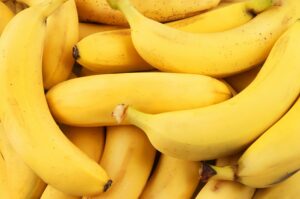
In this blog post, we’ll explore why bananas make a great snack for those dealing with gastroenteritis and possible risks and other tips for managing your symptoms. So, if you or someone you know has recently been diagnosed with gastroenteritis, read on to learn more about why adding some banana goodness into your diet can make a difference in how quickly you recover.
While adults can get gastroenteritis, medical professionals have observed an alarming increase in gastroenteritis cases among children. Characterized by symptoms like nausea, vomiting, fever, abdominal pain, headache, muscle aches, and diarrhea, gastroenteritis can be highly uncomfortable and dangerous, especially for young people. This condition can be caused by bacteria or viruses coming into contact with food or water, but gastroenteritis can also spread from person to person. It is important to be particularly mindful of preventing germs from spreading if gastroenteritis has been diagnosed in someone in the household.
The good news is that most people who suffer from gastroenteritis have an uneventful recovery. Still, parents are caregivers need to be aware of the foods and drinks that should be consumed during recovery, as there is a lot of conflicting advice.
One well-known dietary recommendation for gastroenteritis is the BRAT diet. This stands for bananas, rice, applesauce, and toast. As a collection of bland foods, they are meant to be gentle on the gut.
Historically this recommended diet has fallen out of favor since there are no clinical trials on its effectiveness. However, evidence to support it came from studies that demonstrated how each food could help with gastrointestinal recovery. For example, bananas and apples are rich in pectin, creating a gel in the intestines when consumed and can help with diarrhea. Bananas are also rich sources of potassium, which can help replace what is lost during diarrhea.
Research has shown that rice-based oral rehydration solutions can reduce the volume of stools and duration of diarrhea. These rice drinks are made from a mixture of water, rice, glucose, sodium, and potassium salts. One study from Bangladesh found that in infants, persistent diarrhea was improved with a combination of green bananas and rice.
Although this research shows that the BRAT diet does offer some benefits for gastrointestinal issues, over the past 20 years, health professionals have concluded that it may also be unhealthy because it is low in protein, fat, and energy. All of these nutrients are necessary for healing.
Studies have actually shown that following a regular eating pattern rather than a set diet did not worsen the course of gastroenteritis. This conclusion means it is not necessary to restrict a diet for those suffering from gastroenteritis.
Flat soft drinks are also commonly thought to be helpful for those with gastroenteritis. However, research has shown that consuming them to replenish fluids and glucose lost by vomiting and diarrhea may not be a good idea. When the contents of colas and other sodas were compared with commercially available oral rehydration solutions containing electrolytes, it was found that the soft drinks included very low amounts of sodium, potassium, and other electrolytes. In some cases, these drinks contained as much as seven times the amount of glucose recommended by the World Health Organization for rehydration.
So what should you eat if you are experiencing gastroenteritis? Experts recommend foods such as vegetables, fruits, lean meats, and yogurts. Complex carbohydrates such as rice, wheat, bread, potatoes, and cereal are also recommended.
Studies have also concluded that the use of a probiotic and zinc supplementation can help during the recovery from gastroenteritis.
Maintaining Healthy Digestion
Healthy Colon provides an excellent solution to healthy digestion for those suffering from ailments such as gastroenteritis or IBS. The unique blend of ingredients includes natural sources of fiber, herbal ingredients, and probiotics to help prevent constipation and diarrhea.
Poor digestion can impact the absorption of nutrients and vitamins, depriving the body of the valuable nutrients it desires. But Healthy Colon can target a number of causes of digestive issues, promoting overall colon health and wellness.